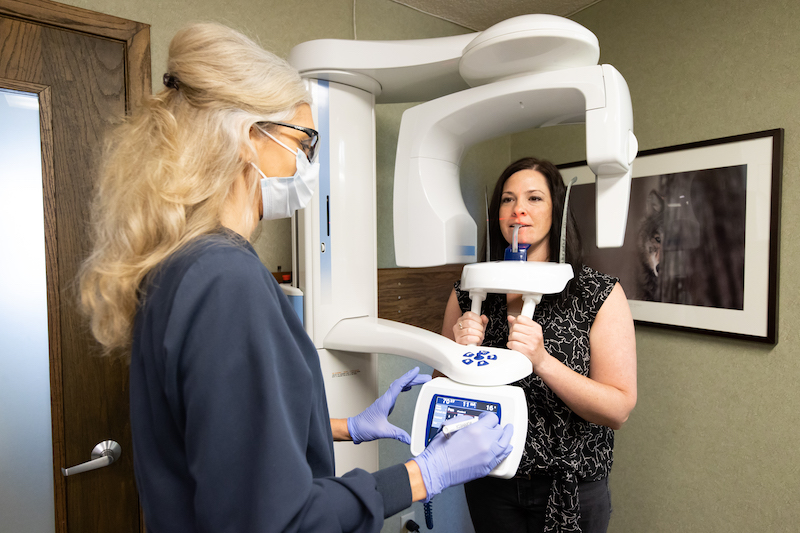Here at Chalet Dental Care in St. Paul, MN, we’re passionate about empowering our patients with knowledge about their oral health. So, let’s explore the what, why, and how of tooth erosion and ways to protect your precious pearly whites.
What Exactly is Tooth Erosion?
Imagine your teeth like a majestic mountain range. Over time, wind and rain can wear down the mountain’s surface, slowly eroding its strength and beauty. Similarly, tooth erosion is the irreversible loss of tooth enamel – the hard, protective outer layer of your teeth – due to acid attacks.
These acids can come from several sources:
- Acidic Foods and Drinks: Think citrus fruits, sodas, sports drinks, wine, and even some healthy options like kombucha and apple cider vinegar.
- Medical Conditions: Acid reflux, GERD, and eating disorders can expose your teeth to stomach acid, leading to erosion.
- Medications: Certain medications, like aspirin and some antidepressants, can contribute to acid erosion.
- Dry Mouth: Saliva plays a crucial role in neutralizing acids and remineralizing teeth. A lack of saliva can leave your teeth vulnerable to erosion.
Why Should You Be Concerned About Tooth Erosion?
You might be thinking, “Okay, so my enamel is wearing down a bit. Is that really a big deal?” The answer is a resounding YES.
Here’s why:
- Increased Sensitivity: As enamel erodes, the underlying dentin – a softer, more porous layer – gets exposed, leading to sensitivity to hot, cold, sweet, or acidic foods and drinks.
- Discoloration: Dentin is naturally more yellow than enamel, so your teeth may appear discolored as erosion progresses.
- Weakened Teeth: Enamel gives your teeth their strength and structure. Erosion weakens teeth, making them more susceptible to chips, cracks, and fractures.
- Difficulty Chewing: Severe erosion can affect your bite and make it difficult to chew food properly, impacting your overall digestion.
Recognizing the Signs: Is Your Smile at Risk?
Tooth erosion often starts subtly, but here are some telltale signs to watch out for:
- Increased Sensitivity: As mentioned earlier, this is often the first sign.
- Transparency: Your teeth may appear more translucent, especially near the biting edges.
- Cupping: You might notice small indentations or “cups” forming on the chewing surfaces of your teeth.
- Discoloration: Your teeth may appear more yellow or darker as the dentin shows through.
- Rough Edges: The edges of your teeth might feel rough or jagged.
Protecting Your Smile: Tips to Combat Tooth Erosion
The good news is that you can take proactive steps to prevent and manage tooth erosion:
- Limit Acidic Foods and Drinks: Enjoy acidic beverages and foods in moderation. When you do indulge, use a straw to minimize contact with your teeth.
- Rinse Your Mouth: After consuming acidic foods or drinks, rinse your mouth with water or chew sugar-free gum to neutralize acids and stimulate saliva production.
- Wait Before Brushing: Don’t brush your teeth immediately after consuming acidic foods or drinks, as the acid can temporarily soften the enamel, making it more susceptible to damage from brushing. Wait at least 30 minutes to allow your saliva to remineralize your enamel.
- Use a Soft-Bristled Toothbrush: Brush gently in circular motions to avoid further enamel wear.
- Stay Hydrated: Drinking plenty of water throughout the day helps keep your mouth moist and promotes saliva production.
- Address Medical Conditions: If you suffer from acid reflux, GERD, or dry mouth, talk to your doctor about managing these conditions to protect your teeth.
- Visit Your Dentist Regularly: Regular checkups and cleanings at Chalet Dental Care are crucial for early detection and management of tooth erosion. We can provide personalized advice and treatment options tailored to your needs.
Top 5 FAQs About Tooth Erosion:
- Can tooth erosion be reversed?
Unfortunately, once enamel is lost, it cannot be naturally regenerated. However, early detection and treatment can prevent further damage and protect your remaining enamel.
- What treatments are available for tooth erosion?
Depending on the severity, treatments may include:
- Fluoride Treatments: Strengthening enamel and making it more resistant to acid attacks.
- Dental Fillings or Crowns: Restoring the shape, function, and appearance of severely eroded teeth.
- Lifestyle Modifications: Adjusting dietary habits and addressing underlying medical conditions.
- Is it safe to whiten my teeth if I have tooth erosion?
It’s best to consult with the doctors at Chalet Dental Care before using any whitening products, as they can further weaken eroded enamel.
- Can children get tooth erosion?
Yes, children are also susceptible to tooth erosion, particularly from sugary drinks and acidic candies.
- How often should I see my dentist if I’m concerned about tooth erosion?
We recommend scheduling a checkup and cleaning at Chalet Dental Care every six months or sooner if you notice any signs of erosion.
Don’t let tooth erosion steal the joy of your smile. By understanding the causes, recognizing the signs, and taking preventive measures, you can protect your precious enamel and maintain a healthy, confident smile for years to come.
Schedule an appointment with our compassionate team at Chalet Dental Care in St. Paul, MN, today. We’re here to answer your questions, address your concerns, and help you achieve optimal oral health.
Contact Our Dental Clinic in St. Paul, MN
If you have further questions about our cosmetic dentistry or preventative oral health services and want to learn more about our New Patient process, reach out to our team at Chalet Dental Care today. Contact us at (651) 413-9150 today for our services.


